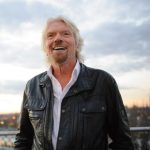Editor’s Note: It’s an annual tradition for TLNT to count down the most popular posts of the previous 12 months. We’re reposting each of the top 30 articles through January 2nd. This is No. 13 of 2017. You can find the complete list here.
∼∼∼∼
Every company, especially a large one, makes every effort to recruit the cream of the crop. However, even a skilled sourcer will experience problems hunting for the right applicant with whom the company will achieve short-term and long-term goals.
Sometimes companies’ CEOs successfully turn into recruiters and win trophies, i.e. outstanding candidates. But how do they succeed? What’s the point? Let’s see how world-famous bosses reveal their recruiting secrets.
Mark Zuckerberg, Facebook CEO
 One of the youngest billionaires believes that candidates’ attitude toward their work matters more than their skills.
One of the youngest billionaires believes that candidates’ attitude toward their work matters more than their skills.
“”I can’t institutionally believe that experience is that important, or else I would have a hard time reconciling myself and the company,” Mark Zuckerberg told Y Combinator, a Silicon Valley startup incubator. Instead, “We invest in people who we think are just really talented, even if they haven’t done that thing before.”
Attitude — fit — is also a key factor. As he told an audience in Barcelona, “I will only hire someone to work directly for me if I would work for that person.”
His Facebook TA team understands the importance of hiring the right people, so they try not to lose savvy specialists, even if they don’t have open vacancies at the moment.
And if Zuckerberg wants to entice a genius, he’ll take them for a walk instead of an official interview. As they stroll, a panorama of the area opens up that includes a view of competing companies’ offices. There he describes the advantages of choosing Facebook rather than some other Silicon Valley company.
Richard Branson, Virgin Group Founder and CEO
 The Virgin Group founder says the first thing he looks for in a candidate is someone who’s personality meshes with the company culture. “Personality is the key,” he says. “If you can find people who are fun, friendly, caring and love helping others, you are on to a winner.”
The Virgin Group founder says the first thing he looks for in a candidate is someone who’s personality meshes with the company culture. “Personality is the key,” he says. “If you can find people who are fun, friendly, caring and love helping others, you are on to a winner.”
Only then does he look at experience and skills. “Some managers get hung up on qualifications. I only look at them after everything else,” he writes in a LinkedIn post.
However, Branson is not afraid of employing mavericks. “Somebody who thinks a little differently can help to see problems as opportunities and inspire creative energy within a group. Some of the best people we’ve ever hired didn’t seem to fit in at first, but proved to be indispensable over time,” he wrote in his post.
In filling top positions, Branson prefers to promote from within. “The employee who is promoted will be inspired by the new role, already know the business inside out, and have the trust and respect of their team.”
Tim Brown, IDEO CEO
 Emotional intelligence in a candidate is important for Tim Brown. When interviewing candidates, his team focuses strongly on their cultural fit. “And for good reason,” Brown says, “IDEO’s stock in trade is creativity, collaboration, and human-centered innovation.”
Emotional intelligence in a candidate is important for Tim Brown. When interviewing candidates, his team focuses strongly on their cultural fit. “And for good reason,” Brown says, “IDEO’s stock in trade is creativity, collaboration, and human-centered innovation.”
“The success of our company depends upon hiring people who are not only smart and talented, but who also have great emotional intelligence. We look for insatiable curiosity, irrepressible optimism, deep empathy, and those who play well with others,” he wrote in his LinkedIn post about hiring.
He looks for these 5 specific qualities in candidates:
- They say “we” more than “I”
- They talk about failures, not just wins.
- They’ve spent time teaching as well as learning.
- They’re nice to the receptionist.
- The candidate has done more than just send in a resume. They’ve “taken creative license and gone the extra mile to demonstrate their capabilities and passion.”
Paul English, Blade and Kayak Co-founder
 As a serial entrepreneur, English learned that the most important skill in building a company is hiring. He wants people with experience, who will fit in and who, as he puts it, “lack dysfunctional behavior.” But at the top of his priority list is what he calls “bandwidth.”
As a serial entrepreneur, English learned that the most important skill in building a company is hiring. He wants people with experience, who will fit in and who, as he puts it, “lack dysfunctional behavior.” But at the top of his priority list is what he calls “bandwidth.”
“I’m a snob for intelligence. I like to surround myself with people who are much smarter and faster than me. People who can juggle ten things at once, and handle curve balls,” he says in a guide to hiring posted on his personal website.
Once they pass that test, then he looks for competitive, passionate people who are goal and results driven, but who can also laugh at themselves and are fun to be around. Their attitude is a key priority, he says.
“I like people who are so confident in their skills that they are openly and instantly humble about things they are not good at. I like people who delight in seeing others perform, and who delight in blowing away customers with awesome products and services. I like people who are open and honest.”
Their specific experience is much less important than their having been successful at something. Experience doing the job for which they are interviewing isn’t necessary, “but they need to bring some new success experience to the team.”
He recounts hiring a candidate who had earned an Olympic medal in rowing. “I did not need him to row, but I knew if he could get an Olympic medal, it said a lot about his determination etc.”
